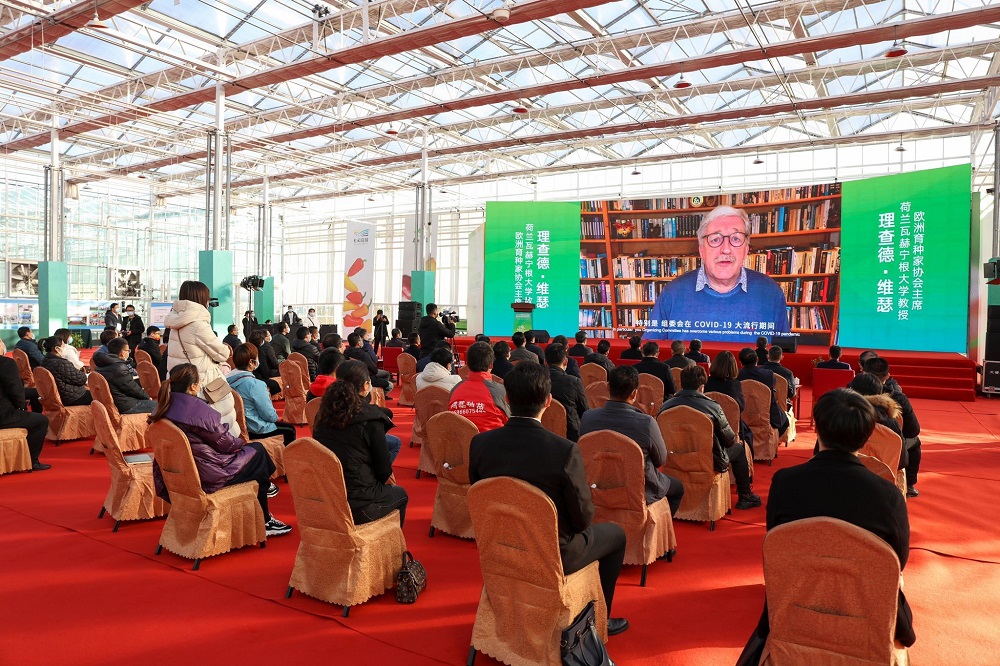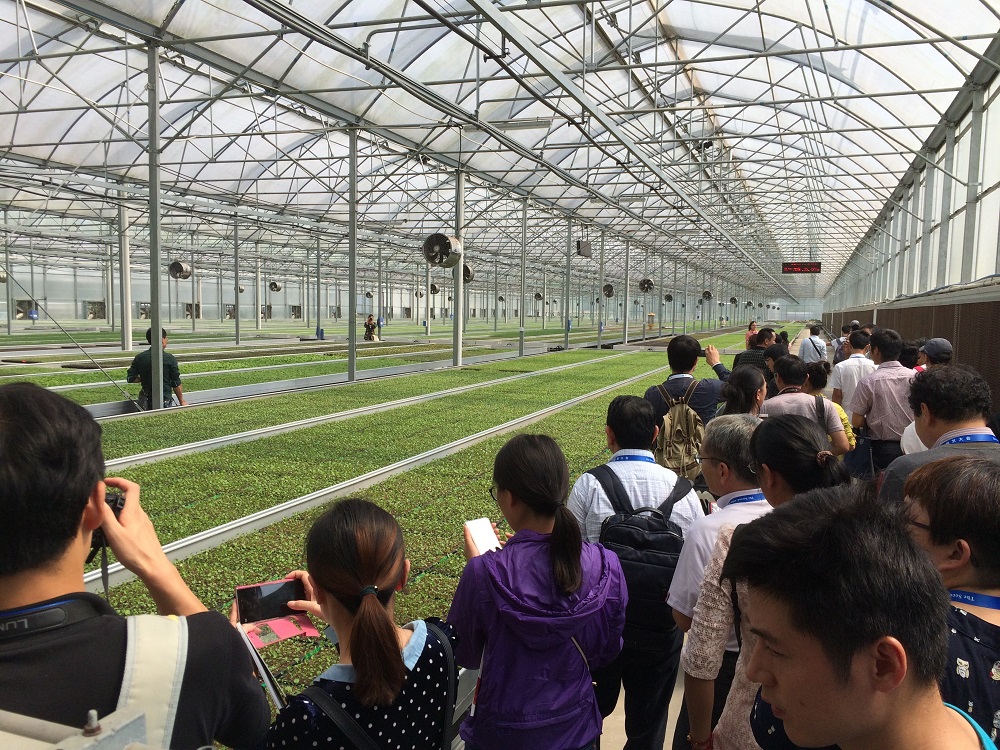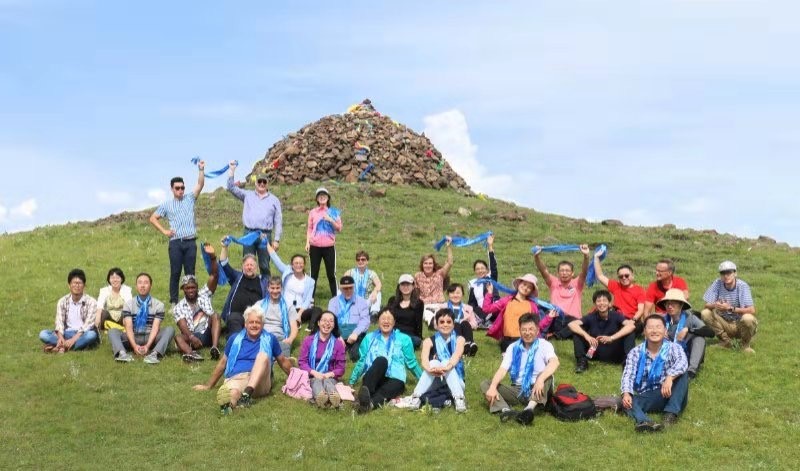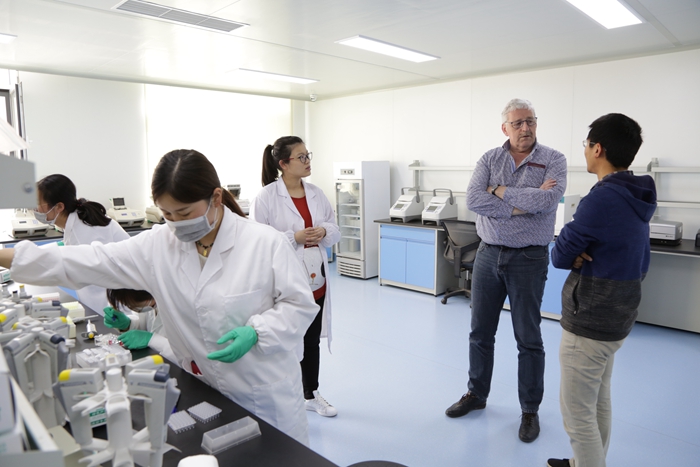
Interview
Collaboration with Chinese Partners: the Art of Plant Breeding
It is incredibly useful to collaborate with China — one of the largest and most influential countries in the world — on an academic level, but it sometimes raises questions as well. In this six-part interview series, we discover exactly how this collaboration works and what it yields for its Wageningen and Chinese partners. Part 4: Richard Visser - Professor of Plant Breeding.
Why are Chinese scientists interested in your work?
“Internationally, the Netherlands is known as an expert in plant breeding: we have a hundred years of experience in research and in practice. Wageningen plays a key role in this domain as we have knowledge, facilities, and very extensive plant collections. Our scientists also intensively collaborate with the many plant breeding companies that are located there. As a result, we have been able to conduct groundbreaking research and develop new plant materials over the past few decades, which has enabled the ornamental, vegetable and fruit breeding sector to arrive at better varieties. The same applies to the agricultural field crops breeding sector, potato.”

What exactly is plant breeding?
“We make changes to the genetic make-up of plants by crossing specific parent lines (editor’s note: the DNA of plant A and B). Take the potato: globally, we cultivate Solanum tuberosum on a massive scale, but there are numerous other wild tuber bearing species that have useful positive properties, such as being more resistant to drought or diseases.
With plant breeding, you increase yield and respond to climate change
By adding those properties to the potato varieties that we cultivate, you will increase the yield per square metre. Research has shown that this also applies to many other crops, such as peppers and chrysanthemums. An added advantage is that you will need to use fewer pesticides, and you respond to climate change as well. Examples of this are onions and leeks that are more resistant to the higher soil salinity that we will have to deal with as a result of encroaching seawater.”
Why does China need plant breeding for crops?
“They mainly need it for food production. Feeding 1.4 billion people requires an agricultural and horticultural sector that is as efficient as possible. However, China is now producing so much that there is scope for export, particularly in the higher quality segment. In addition to food — rice and vegetables such as peppers and tomatoes — there is a demand for flowers as well, from countries such as Korea and Japan. The demand for these high-quality products is also rising in China itself as the average income is increasing.

What does the collaboration with Chinese partners involve?
“There are many Chinese students and PhD candidates who come to Wageningen. This is nothing new: this collaboration dates back to the time of Professor Evert Jacobsen: the Wageningen expert in the field of plant breeding. The first Chinese PhD student arrived in 1990, since then we have supervised 37 PhD candidates. Since 2010 and in collaboration with Chinese universities and institutions such as the Chinese Academy of Agricultural Sciences (CAAS) in Beijing, Plant Breeding at WUR has offered courses on plant breeding, biotechnology, and seed technology to plant breeding companies in China.”
Chinese companies?
“Initially, they were mostly international companies located in China. Until ten years ago, there were hardly any Chinese companies: plant breeding was the domain of the universities and research institutions. However, the government decided to privatise plant breeding to gain more influence over which varieties are cultivated on Chinese soil.
Chinachem is one of the most important plant breeding companies in the world
Chinese scientists then established their own small companies which merged into larger companies five years ago at the initiative of the government. Leading the way is Chinachem, which took over the originally Swiss multinational Syngenta a few years ago, making it one of the most important plant breeding companies in the world.”
Why would WUR want to help Chinese companies?
“In a broad sense: we want to share our knowledge. WUR educates scientists and employees of companies all over the world, so that they can work better, more efficiently, and more sustainably there. We also see this with the Chinese PhD candidates: most of the ones that we supervise in Wageningen return to universities in China.”
We are not sharing all our knowledge with anyone, including China
Of course, WUR also benefits from this collaboration: it means that we can conduct research in a country with different climates and different crops that do not grow here such as rice and peanuts. Additionally, China is home to many smart people who can help us with this research.”
We’re not really sharing everything with our Chinese partners, are we?
“We are not sharing all our knowledge with anyone, including China. Our department has access to sensitive information that is not only ours, but also belongs to the companies that we work with. Additionally, our knowledge may have direct economic or, let’s not forget, scientific value. The pressure on PhD candidates to publish is enormous in some countries, and sometimes so stressful that researchers do things that are not above board. We have had the experience of people suppressing results and data and then reading about it in an academic journal months later, for example. And no, they were not Chinese.”

China has been criticised for its handling of privacy, monitoring people, and institutions. Have you noticed this?
“No, not really, but I’m not that naive to think that this monitoring does not apply to me. It would not surprise me if they know about our collaboration with Chinese partners in China. The Chinese government is part of universities and businesses: it is not as separate as it is here. The question is whether that is a problem for the work we do together: I don’t think so.
I accept that they think differently about privacy and personal freedom because I am a guest
Although I can also see the advantages of a top-down approach — just look at the speed at which innovations such as high-speed trains are implemented — I find that it is not always easy to deal with that culture. I accept that they think differently about privacy and personal freedom because I am a guest, but I am quite happy that my face is not broadcasted on a large video screen when I commit a traffic offence.”
Did that happen to you over there?
“No, I find crossing the street safely with a green pedestrian light a challenge already, let alone daring to do so on a red light. Look, as an outsider I can have my opinions of the Chinese system, but it is not up to me to decide what is ‘normal’. I have noticed that Chinese students are less bothered about giving up some of their privacy. The more you tell a web shop such as Alibaba, the larger the discount you will get. Many of them think: I don’t have any secrets, I’d rather have the 5% discount. The most important thing for me is that we can talk about these types of dilemmas. Ultimately, our collaboration is about breeding crops such as potatoes: that is at the heart of it.”
Speaking of standards: do the Chinese have the same strict rules regarding genetic modification as we do in Europe?
“They have sound regulations, and my experience is that they adhere to them. However, the new technology of gene editing may be a potential concern. It is used to change the DNA of a plant without adding other DNA to it. Research into this is conducted in many places in the world — including Wageningen: think of the CRISPR-Cas technique that makes the process easier and more affordable — but it is officially not allowed in the EU to cultivate and trade such varieties because it counts as genetic modification (GM). In many other countries, including China, this lies outside of the GM legislation and regulations. However, these seeds and plants still might end up in Europe through export, although plant breeders are usually unwilling to work with them.”

Is this because they are afraid that they will violate nature?
“No, that won't happen so quickly with gene editing as it concerns DNA changes within the species after all. Plant breeders are unwilling to use them because they cannot see whether a foreign seed was edited and is therefore prohibited in the EU (editor’s note: gene editing is untraceable). If this continues in Europe for much longer, then that may be detrimental. This is because in that case we will not profit from the quality benefits of plant varieties that were bred elsewhere, and that may ultimately lead to the deterioration of the genetic diversity in varieties in Europe.”
We train Chinese scientists and companies, and they are taking off quickly. Are we not giving away our lead in the Netherlands?
“I've been getting that question for a long time and I understand the concern as China could well outpace us in the long run. WUR has been in first place in global rankings for a long time, but the China Agricultural University is right behind us.
We may exchange places with China in the long run, but we’re not there yet
As editor of journals such as Euphytica, Theoretical and Applied Genetics, and Molecular Breeding, I’ve noticed that more and more Chinese scientists publish in academic journals independently. Sometimes, all articles in a single issue are of Chinese origin, so we may be exchanging places with them in a while but we’re not there yet. Chinese companies continue to look to WUR for our advanced knowledge and techniques such as in the case of research into plant diseases that you want to study but not in your own company because of possible contamination.
So it is not a race?
“No, that is not how I see it. I don't think we should be so distracted by the growth of the breeding market in which China also wants to play a leading role. Our interest as scientists is primarily focused on the long term: ensuring that there is enough healthy food in the world for everyone and that we produce what we need in a sustainable way, using as few natural resources as possible and using a minimal amount of pesticides and fertilizers. Commercial companies are also increasingly taking the planet into account, but it is not their primary goal. It is for WUR, and that is why it is so important that we develop the knowledge and tools they can use to produce more plants without exhausting the earth.”